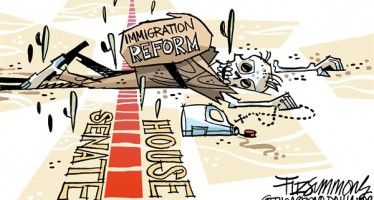Senate mulls hospital fee hike
August 10, 2010
By KATY GRIMES
Federal stimulus money designated for California’s Medi-Cal program could be on the way to the state if Congress extends the Federal Matching Assistance Program, also known as the federal stimulus fund program. With the California Department of Health Care Services receiving a sizable windfall if Assemblyman Dave Jones, D-Sacramento, can get AB1653 passed, California appears perched on the edge of increasing the size of state-government-sponsored health care.
Providing matching Medi-Cal money, AB1653 would establish another “quality assurance fee” on private general acute care hospitals, as a condition of a hospital participating in state funded health insurance programs, other than the Medi-Cal Program. Public hospitals are excluded from the fee assessment.
In a Senate Appropriations committee hearing Monday, Jones argued that private hospitals in the state are financially stressed because of the “vulnerable populations” they serve. However, there is no language in AB1653 acknowledging that the hospitals are required by state law to serve the “vulnerable populations.”
Jones said that years of low Medi-Cal reimbursement payments, combined with the current effects of the recession, as well as the increasing numbers of indigent people using the hospitals, threaten the stability of the hospital “safety net” in the state.
According to Senate Health Committee analysis, California ranks 49th in the country for providing enough hospital beds based on state population. The committee analysis states that California only has 1.9 beds for every 1,000 people in the state.
California funds a portion of the state’s Medicaid Program through fees charged to health care providers. According to a Senate analysis, using this “funding method,” the state receives matching funds from the federal government on the fees collected.
Jones’ bill is designed to generate another $2 billion in annual fee revenue, of which, $320 million will go to the Department of Health Care Services for program administration. The remainder will go to hospitals that serve Medi-Cal and uninsured patients.
The interesting twist is that the federal law that governs hospital provider fees specifically prevents states from levying fee assessments on certain hospitals, and instead, must be “broad-based” and uniformly imposed. Hospitals that do not serve Medi-Cal patients pay all fees and levies, right along with hospitals that do serve Medi-Cal and uninsured patients. These funds are used to increase Medi-Cal reimbursements to health care providers.
The Howard Jarvis Taxpayers Association, which opposes AB1653, argues that the bill increases taxes, and should have a two-thirds vote of the Legislature. HJTA also states that taxes should not be raised on California’s “beleaguered hospitals.”
Jones has succeeded with previous legislation to establish similar fees on hospitals, thereby raising revenue for the Medi-Cal program.
AB188 and AB1383 were both signed by the governor in 2009, and authored by Jones, and charge more fees on hospitals in order to raise additional funds for Medi-Cal programs.
Another Medi-Cal bill currently winding through the Legislature is Jones’ AB1542, which would establish “the definition of a medical home,” and prohibit practitioners from representing as such, unless and until they meet specific state-approved standards. The stated goal of the legislation is to improve medical care of Medicaid and Medi-Cal recipients.
Federal government health care reform supports the medical homes concept, and if passed, would provide grants to physicians, nurses and assistants, and create pilot Medi-Cal programs, as well as an entire medical system surrounding the concept. The bill is scheduled to be heard in the rules committee soon and appears to be predicated on federal health reform as well as passage of AB1653.
Jones said in the Senate Appropriations Committee Monday that the purpose of 1653 is to take advantage of the Federal Matching Assistance Program when and if it passed in Congress, however, nowhere in the bill does it yet specify how the fees will be assessed. Jones has acknowledged that until federal approval has taken place, he cannot specify how fees will be assessed.
AB1653 was placed on the suspense file until Thursday, when Jones will be required to lay out the specific mechanics of the assessments.
Ironically, hospital associations are in support of Jones’ legislation because of the “historically low Medi-Cal reimbursement payments,” according to testimony during the appropriations hearing, as well as Senate analysis. The SEIU and American Federation of State County and Municipal Employees are also in support.
Related Articles
Study finds corporate tax breaks are ‘corporate welfare’
Jan. 31, 2013 By Katy Grimes A new study just released by the Howard Jarvis Taxpayers Foundation and the Reason Foundation
Roseville Avoiding Liability
Katy Grimes: With the report out today about how the fire at the Roseville Galleria Mall in October so amazingly
Some CA Republicans move Left on immigration
While several California Republican congressmen have reiterated previous support for comprehensive immigration reform in recent days, it is still unlikely



